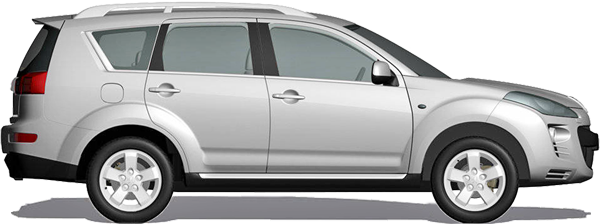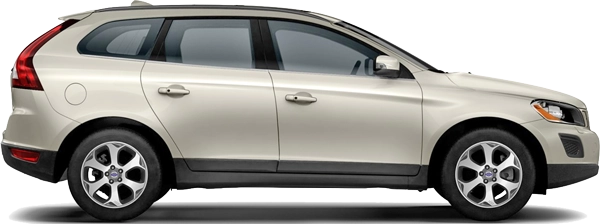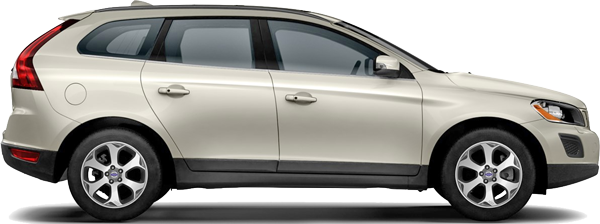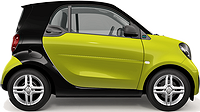The Comparative Analysis :
Peugeot 4007 170 CVT-Automatic (7-seater) (08 - 09) vs. Volvo XC60 2.0T Powershift Geartronic (10 - 11)
€ 33,100

€ 36,300

€ 33,100
Base Price ⓘBase price of a new vehicle with standard equipment in Germany at market launch.
€ 36,300
ⓘBase price of a new vehicle with standard equipment in Germany at market launch. Price Info
Vehicle Dimensions
The dimensions of these vehicles differ slightly. The Peugeot 4007 170 is 0.3 inches longer, 3.4 inches narrower and 1.7 inches lower than the Volvo XC60 2.0T.
Peugeot 4007 170
Volvo XC60 2.0T
65.7
71.1
81.6
67.4
74.4
83.5
71.1 in
Width
74.4 in
81.6 in
Width Incl. Mirrors
83.5 in
65.7 in
Height
67.4 in
105.1
182.5
109.2
182.2
182.5 in
Length
182.2 in
105.1 in
Wheelbase
109.2 in
Vehicle Weight
Peugeot 4007 170
Volvo XC60 2.0T
3781 lb
Curb Weight
4041 lb
5049 lb
Gross Vehicle
Weight
Weight
5004 lb

Weight Difference:
260 lb
6.43 %

General
Peugeot 4007 170
Volvo XC60 2.0T
V*
Generation
D
Sport Utility Vehicle
Car Body Style
Sport Utility Vehicle
Mid-Grade Unleaded
Fuel Type
Mid-Grade Unleaded

On-demand four-wheel drive (4WD) with engagement by the vehicle's operator
Drivetrain
Front-wheel drive

Continuously variable transmission (CVT)
Transmission
6-speed dual clutch transmission
Engine
Peugeot 4007 170
Volvo XC60 2.0T
Straight-four gasoline engine (naturally aspirated engine)
Engine Type
Straight-four gasoline engine with turbocharger
4B12
Engine Code
B4204T6
4
Valves
4
4
Cylinders
4
2.4 L / 117 cu in
Displacement
2 L / 98 cu in
168 hp
at 6000 rpm
Power
200 hp
at 6000 rpm
Peugeot 4007 170
168 hp
200 hp
Volvo XC60 2.0T
171 lb‑ft
at 4100 rpm
Max. Torque
221 lb‑ft
at 1750 rpm
Peugeot 4007 170
171 lb‑ft
221 lb‑ft
Volvo XC60 2.0T
Performance
Peugeot 4007 170
Volvo XC60 2.0T
118 mph
Maximum Speed
127 mph
10.4 sec
Acceleration 0 to 62 mph
8.9 sec
62 mph
62
mph
mph
472 ft
0.000 sec

Peugeot 4007 170
62 mph
62
mph
mph
407 ft
0.000 sec

Volvo XC60 2.0T
▶ REPLAY
22.51 lb/hp
Weight-to-Power Ratio
20.21 lb/hp
Peugeot 4007 170
22.51 lb/hp
20.21 lb/hp
Volvo XC60 2.0T
Fuel Economy / Emissions
Peugeot 4007 170
Volvo XC60 2.0T
Fuel Economy
25 mpg
combined
28 mpg
Peugeot 4007 170
25 mpg
28 mpg
Volvo XC60 2.0T
19 mpg
city
21 mpg
31 mpg
highway
34 mpg
15.9 gal
Fuel Tank Capacity
18.5 gal
401 mi
Range
512 mi
Peugeot 4007 170
401 mi
512 mi
Volvo XC60 2.0T
Environmental Impact
176.2 kWh
Total Energy Consumption
per 100 miles ⓘThe total energy consumption per 100 miles is the amount of energy consumed by a vehicle when burning fuel or using electricity per 100 miles (final energy), and the energy required to produce the appropriate amount of fuel or electricity (primary energy).
per 100 miles ⓘThe total energy consumption per 100 miles is the amount of energy consumed by a vehicle when burning fuel or using electricity per 100 miles (final energy), and the energy required to produce the appropriate amount of fuel or electricity (primary energy).
161.1 kWh
Peugeot 4007 170
176.2 kWh
161.1 kWh
Volvo XC60 2.0T
Euro 4
Emission Standard
Euro 5
357 g/mi (NEFZ)
CO2 Emissions
319 g/mi (NEFZ)
Practical Convenience
Peugeot 4007 170
Volvo XC60 2.0T
5
Doors
5
7
No. of Seats
5
1268 lb
Maximum Payload
963 lb
5.2 cu ft
Trunk Volume
14 cu ft









47.7 cu ft
Cargo Volume (Seats Down)
41.2 cu ft




















